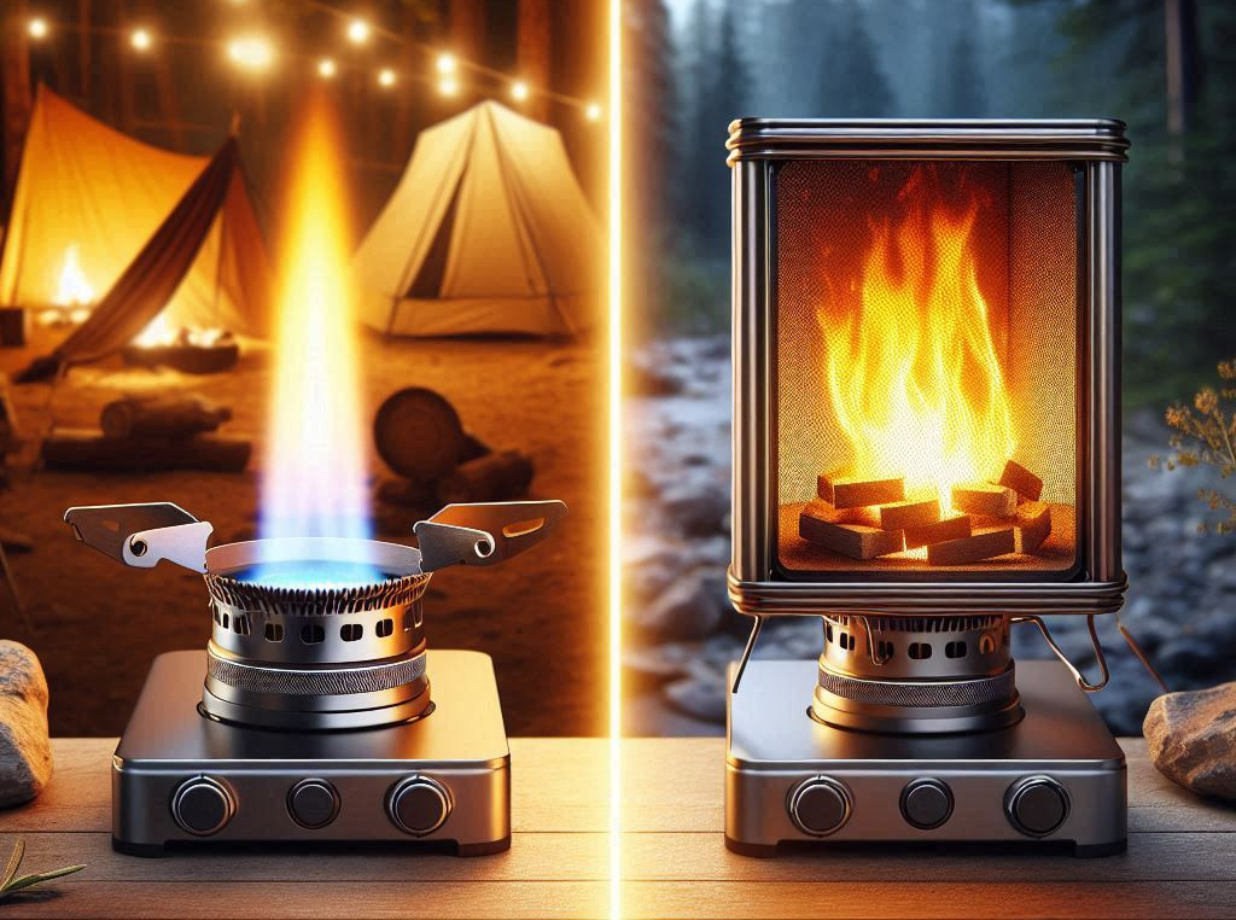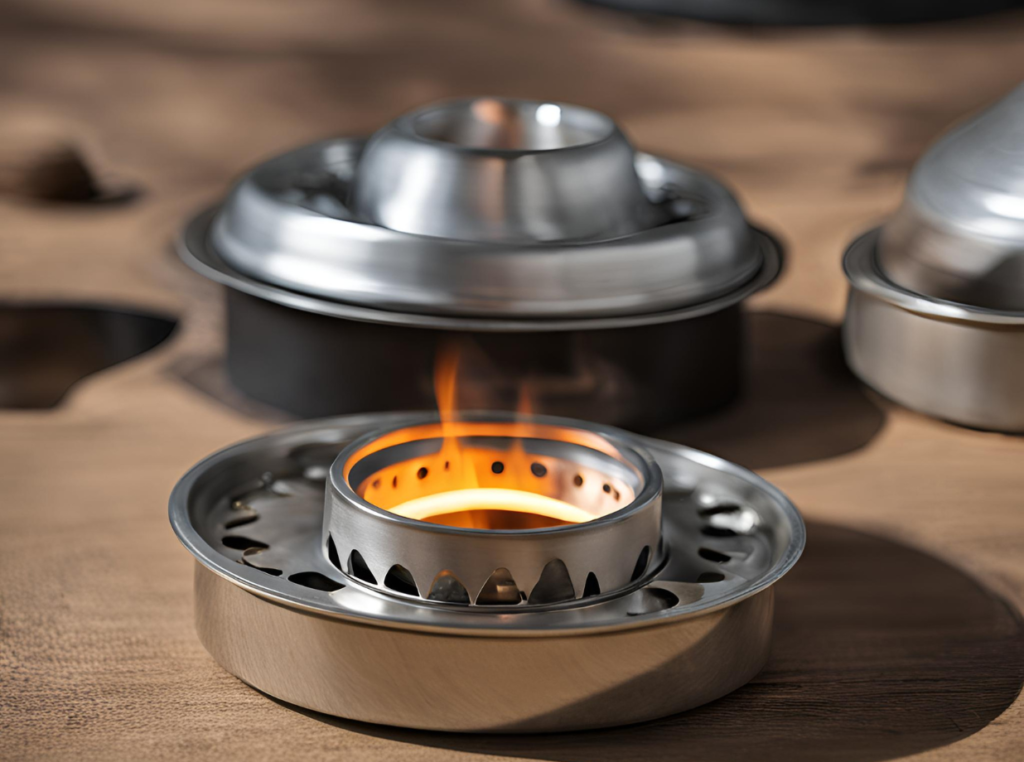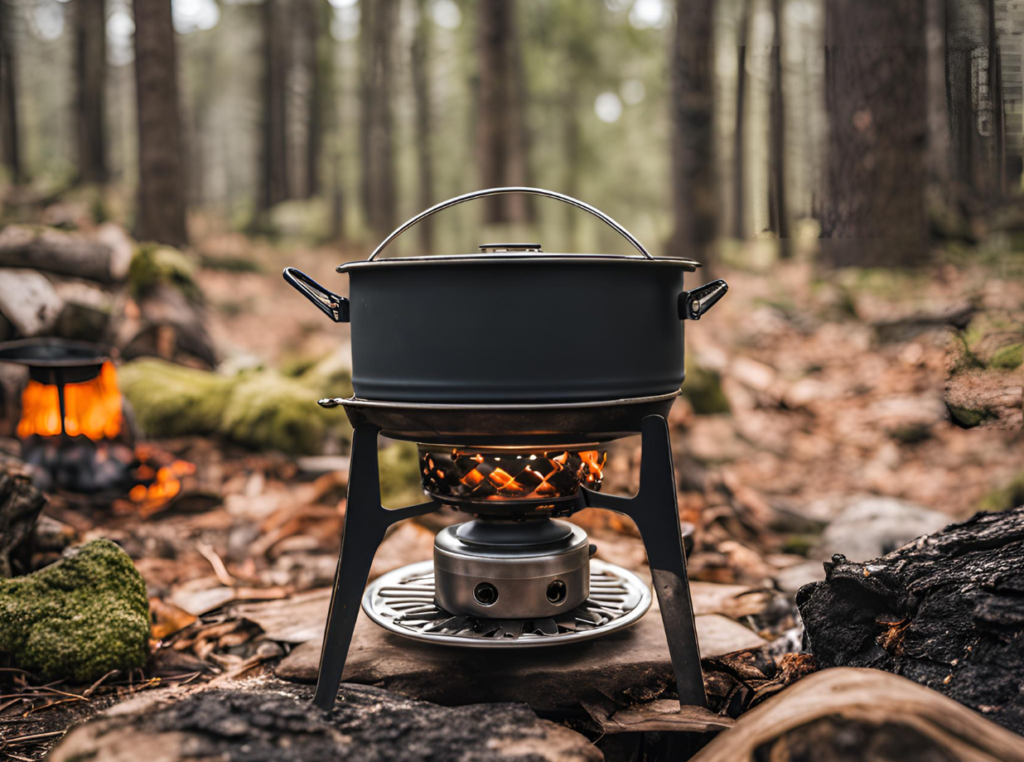Planning your next outdoor trip? Wondering which stove fuel is best for you? Choosing between an alcohol stove and a solid fuel stove can change your camping or backpacking experience. But which one is best for you? Let’s dive into the world of fuel types and find out what could make or break your next adventure.
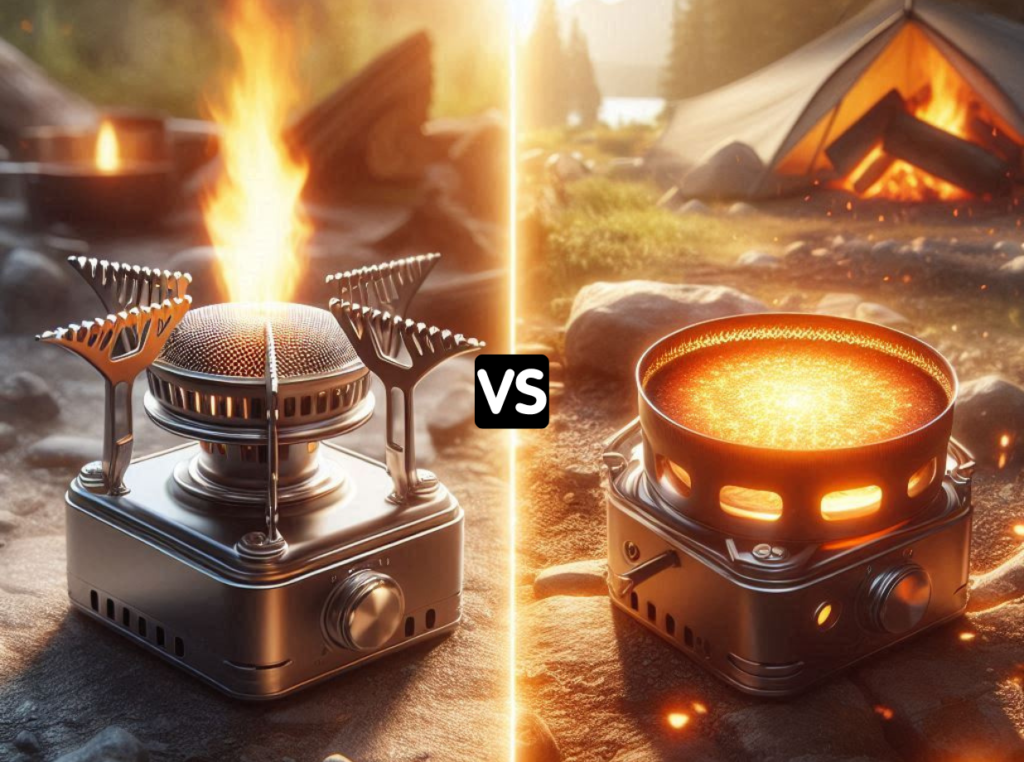
A split-screen comparison showing an alcohol stove on one side, featuring a sleek, modern design with a flame burning brightly, and on the other side, a solid fuel stove made of rugged metal with glowing solid fuel tablets. The background should depict a campsite scene, with natural elements like trees and rocks, highlighting the outdoor setting. The lighting should give a warm and inviting feel, emphasizing the functionality and aesthetic of both stove types in use.
Key Takeaways
- Understand the pros and cons of alcohol stoves and solid fuel stoves
- Explore the different types of fuel and their unique characteristics
- Discover the advantages of each fuel type for your specific outdoor activities
- Learn how to choose the right stove and fuel based on weight, packability, and environmental impact
- Ensure your cooking performance and versatility align with your backpacking or camping needs
As you plan your next outdoor adventure, have you thought about which stove fuel is most efficient and eco-friendly? The choice between an alcohol stove and a solid fuel stove can greatly affect your experience. What should you think about when picking the right fuel for your needs?
Exploring the Pros and Cons of Alcohol and Solid Fuel Stoves
Choosing the right camp stove for your outdoor adventure is crucial. It’s a choice between alcohol stoves and solid fuel stoves. Each has its own benefits and things to consider. Let’s look at the pros and cons to help you decide.
The Advantages of Alcohol Stoves
Alcohol stoves are popular with ultralight hikers and minimalist campers. They are very portable and efficient. These stoves use denatured alcohol, which is easy to find and not expensive. They boil water fast, making them great for backcountry cooking and heating drinks.
The Drawbacks of Alcohol Stoves
Alcohol stoves are convenient but have some downsides. Finding fuel can be hard in remote places, and they burn out quickly. They also don’t work well in cold or windy weather, which can slow down cooking.
The Reliability of Solid Fuel Stoves
Solid fuel stoves are dependable and consistent. They use fuel tablets or cubes that are easy to light and keep a steady flame. Solid fuel is easy to find in outdoor stores. It’s a good choice for campers who want reliable cooking and easy use.
The Weight Factor
Solid fuel stoves are heavier than alcohol stoves. This might be a problem for hikers and backpackers who want to carry less weight. For long trips, saving weight is important.
| Feature | Alcohol Stoves | Solid Fuel Stoves |
|---|---|---|
| Fuel Type | Denatured alcohol | Fuel tablets or cubes |
| Boil Time | Faster | Slower |
| Fuel Availability | Can be limited in remote areas | Generally more widely available |
| Weight | Lighter | Heavier |
| Burn Time | Shorter | Longer |
| Reliability | May be affected by wind and cold | More consistent performance |
When picking between alcohol and solid fuel stoves, think about what you need for your outdoor adventures. Consider how important portability, performance, and fuel availability are to you. Knowing the pros and cons of each type will help you make a choice that fits your camping and backpacking style.
The Alcohol Stove: Lightweight and Efficient
Outdoor lovers looking for lightweight and efficient camping gear often pick the alcohol stove. These small but powerful units are great for ultralight camping and backpacking. They offer many benefits that make them a favorite.
Understanding Alcohol Fuel
The alcohol stove relies on alcohol fuel. This clean-burning liquid comes from denatured alcohol or methylated spirits. It’s a reliable and easy-to-light fuel for your outdoor kitchen. You can easily find alcohol fuel at many outdoor and hardware stores, making it a great pick for lightweight backpacking gear.
Advantages of Alcohol Stoves
Here are the main benefits of alcohol stoves:
- Lightweight Design: These stoves are much lighter than traditional ones. They’re perfect for ultralight camping and backpacking.
- Efficient Fuel Consumption: Alcohol fuel is very efficient. It lets you use less fuel and carry less, which is great for camp stove efficiency.
- Compact Size: They’re small and can fit inside pots or pans. This means they take up little space in your pack, helping you pack more efficiently.
- Simplicity: Using an alcohol stove is easy. They have a simple design that needs little upkeep. This makes them a dependable choice for outdoor trips.
Whether you’re going on a tough ultralight camping trip or just want a versatile and efficient stove, the alcohol stove is a great choice. It combines many useful features and benefits that outdoor lovers appreciate.
Solid Fuel: Traditional and Reliable
Solid fuel stoves are still a top choice for many outdoor lovers. They are strong and dependable. These stoves are great for traditional camping and reliable backpacking.
Types of Solid Fuel
Solid fuel for camping stoves is usually in the form of tablets or cubes. They are small, light, and easy to carry. This makes them perfect for outdoor trips. Here are some common solid fuels:
- Esbit fuel tablets
- Hexamine fuel cubes
- Solid alcohol fuel blocks
Benefits of Solid Fuel Stoves
Solid fuel stoves have many benefits for camping or backpacking. Here are some main advantages:
- Dependability: These stoves work well in tough outdoor conditions.
- Versatility: They can do many cooking tasks, like boiling water or simmering meals.
- Ease of Use: They are easy to set up and use, perfect for beginners.
- Compact Size: They are small and light, great for ultralight hiking and backpacking.
For a weekend camping trip or a long backpacking journey, solid fuel stoves are a reliable choice for cooking outdoors.
Alcohol Stove vs Solid Fuel: Key Considerations
Choosing between an alcohol stove and a solid fuel stove for backpacking involves several key factors. Each fuel type has its own unique traits and trade-offs. This can help you pick the best option for your outdoor needs and likes.
One major thing to think about is fuel availability and convenience. You can easily find alcohol fuel at many outdoor stores or use items from home. Solid fuel, however, might need more planning to get. It’s often sold in special camping shops or online.
| Fuel Type | Fuel Availability | Fuel Convenience |
|---|---|---|
| Alcohol Stove | High | High |
| Solid Fuel Stove | Moderate | Moderate |
Another important factor is the environmental impact and following leave no trace principles. Backpackers aim to leave the outdoors as they found it. Alcohol stoves burn cleaner with less smoke and residue, making them better for the environment. Solid fuel can leave behind visible signs, which might be a problem in delicate outdoor areas.
The choice between an alcohol stove and a solid fuel stove depends on your personal likes, the needs of your outdoor trips, and how much you care about fuel availability, convenience, and environmental impact.
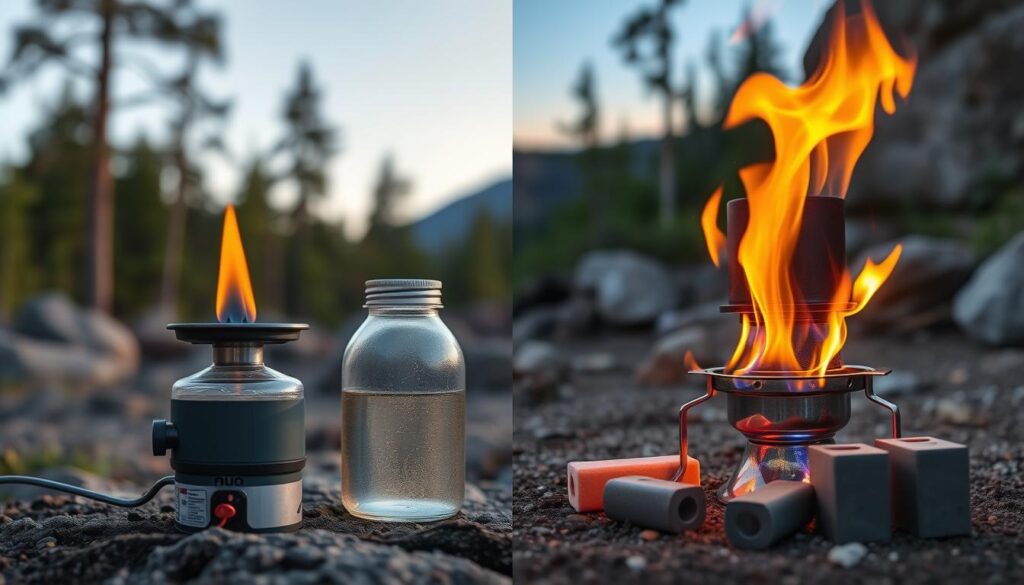
A split scene depicting an alcohol stove on one side with a small flame glowing softly and a clear liquid fuel container beside it, while on the other side, a solid fuel stove burns with vibrant flames and compact fuel blocks nearby, set against a natural outdoor backdrop with trees and rocks, showcasing the contrasting fuel types in a harmonious camping environment.
Weight and Packability: Ultralight Hiking Essentials
For those who love to hike and camp, the weight and how easy it is to pack your stove can really matter. In ultralight backpacking and lightweight camping gear, every ounce counts. Choosing between an alcohol stove and a solid fuel stove can greatly affect your pack size and stove weight.
Comparing Weight and Size
Alcohol stoves are known for being super light and small. They can weigh just a few ounces, making them great for ultralight backpacking. Solid fuel stoves are reliable but heavier because they’re made of more material and have the fuel to carry.
| Feature | Alcohol Stove | Solid Fuel Stove |
|---|---|---|
| Average Weight | 2-4 oz (57-113 g) | 4-8 oz (113-227 g) |
| Pack Size | Highly compact, fits in your hand | Larger, often requires more space in your pack |
| Alcohol stove vs solid fuel weight | Significantly lighter | Heavier |
Alcohol stoves are loved for their small size and lightweight. They let hikers save space and carry less gear, making them a top pick for ultralight backpacking.
Fuel Availability and Resupply
Outdoor adventures often depend on how easy it is to get more fuel for your stove. You need to think about whether to use an alcohol stove or a solid fuel stove. Each has its own way of getting fuel and resupplying.
Alcohol fuel is easy to find in many outdoor stores and some regular shops. This makes it simple to get more fuel for your alcohol stove while you’re out. The small size of alcohol fuel canisters makes them easy to carry and resupply.
Solid fuel tablets or blocks might be harder to find than alcohol fuel. But, they’re small and light, so you can bring enough for your whole trip. This means you won’t need to stop and get more fuel often.
| Fuel Availability | Resupply Options |
|---|---|
| Alcohol Fuel | Widely available in outdoor stores and some retail outletsCompact and portable fuel canistersEasy to resupply during your adventure |
| Solid Fuel | May be less readily available in some locationsCompact and lightweight fuel tablets or blocksReduced need for frequent resupply during your trip |
When you’re planning your outdoor cooking, think about where you’ll be and how easy it is to get fuel. Also, think about how easy it is to get more fuel during your trip. This will help you choose between an alcohol stove or a solid fuel stove that fits your needs.
Environmental Impact and Leave No Trace Principles
As outdoor lovers, we must think about how our camping gear affects the environment. When picking between alcohol stoves and solid fuel stoves, we should consider their impact on nature.
Minimizing Your Footprint
Alcohol stoves are better for the environment than solid fuel stoves. They burn cleaner and leave behind less trash. This makes them a top choice for sustainable backpacking. They are also easy to carry and follow leave no trace principles, reducing waste.
- Alcohol stoves produce fewer emissions and leave less residue than solid fuel stoves.
- The compact design of alcohol stoves simplifies leave no trace principles.
- Alcohol stoves are a more environmentally friendly choice for eco-friendly camping.
On the other hand, solid fuel stoves can be harder to clean up. They often require getting rid of used fuel, which can be tough in the wild. This can lead to more waste and harm the environment.
Choosing alcohol stoves is a better option for caring for the outdoors. They help us leave less of a mark, protecting the nature we love.
Cooking Performance and Versatility
Outdoor cooking is all about how well your stove performs and how versatile it is. Whether you’re making a feast in the backcountry or a simple meal outside, the right stove changes your outdoor cooking game.
Alcohol stoves and solid fuel stoves each shine in different ways. Alcohol stoves are known for their fast and efficient heat. They’re perfect for boiling water quickly, like for dehydrated meals or coffee. Solid fuel stoves, however, offer a controlled flame. This lets you simmer sauces, sauté veggies, or even bake small items.
When it comes to versatility, solid fuel stoves lead. They work with many pot sizes and shapes, making them great for various outdoor meals. But alcohol stoves are best for single-pot cooking, ideal for simple backcountry meals.
| Feature | Alcohol Stove | Solid Fuel Stove |
|---|---|---|
| Cooking Performance | Efficient heat output, great for boiling water and preparing dehydrated meals | Controlled, adjustable flame, suitable for simmering, sautéing, and baking |
| Stove Versatility | Better suited for single-pot cooking | Accommodates a wider range of pot sizes and shapes, enabling more diverse cooking tasks |
Choosing between an alcohol stove or a solid fuel stove depends on your outdoor cooking needs. Think about your menu, cooking style, and the types of meals you’ll make. This will help you pick the best stove for your cooking and versatility needs.
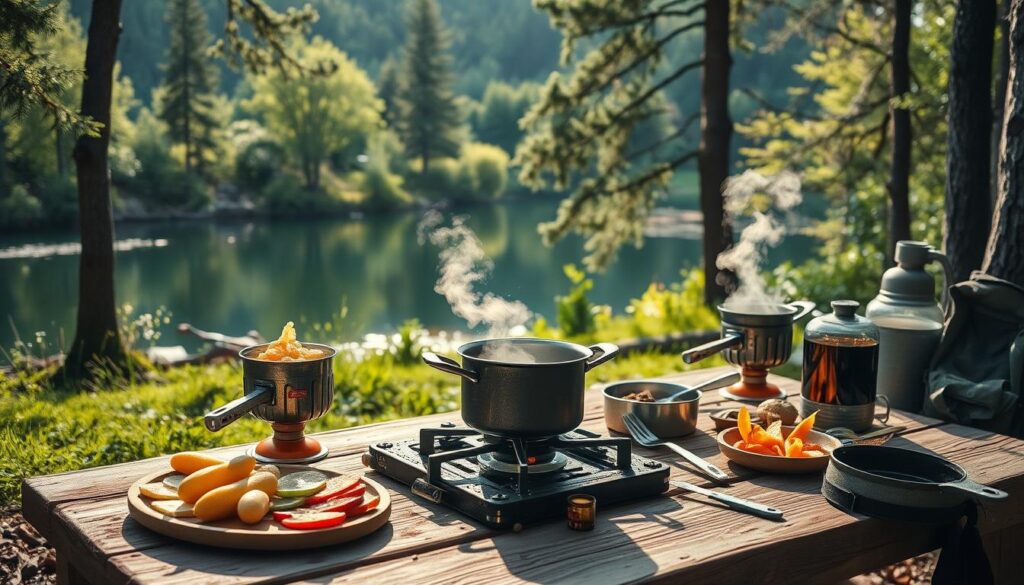
A serene outdoor cooking scene featuring a portable alcohol stove and a compact solid fuel stove set up in a picturesque natural environment, surrounded by lush greenery and a tranquil lake. Emphasize the cooking process with pots simmering over the flames, steam rising, and delicious ingredients laid out on a rustic wooden table. Include camping gear, like backpacks and utensils, to enhance the adventurous spirit of outdoor cooking. Soft sunlight filtering through the trees adds warmth to the atmosphere.
Conclusion
Choosing between an alcohol stove and a solid fuel stove for outdoor adventures is not easy. Each type has its own benefits and things to think about. You need to weigh your needs and what you like to get the best choice for your next trip.
Looking at the pros and cons of both stoves helps you understand what matters most. This includes things like fuel availability, how well it cooks, its weight, and how it affects the environment. With this knowledge, you can pick a stove that meets your alcohol stove vs solid fuel, choosing backpacking stove, camp stove decision, and outdoor cooking fuel needs. This makes your outdoor time more enjoyable and eco-friendly.
Choosing a stove is about more than just the fuel. It’s about enjoying nature, sharing meals with friends, and making memories. With the right stove and a sense of adventure, your next trip will be a hit.
Frequently Asked Questions
What are the key differences between alcohol stoves and solid fuel stoves?
The main differences are in the fuel type, weight, size, fuel availability, and environmental impact. Alcohol stoves are lighter and more efficient. Solid fuel stoves are traditional and reliable.
What are the advantages of using an alcohol stove?
They are compact, light, and efficient. This makes them great for ultralight backpackers and campers. They’re easy to use and boil water fast.
What types of solid fuel are available for stoves?
Solid fuel stoves use fuels like hexamine tablets, wood pellets, and esbit fuel cubes. Each fuel type has its own benefits.
How do the weight and packability of alcohol stoves and solid fuel stoves compare?
Alcohol stoves are lighter and more compact. This makes them ideal for ultralight hikers and backpackers. The stove and fuel’s weight and size affect your gear’s overall weight and how easy it is to carry.
How do alcohol stoves and solid fuel stoves differ in terms of fuel availability and resupply?
Fuel availability and resupply are key in outdoor adventures. Alcohol fuel is easy to find but needs more frequent resupply. Solid fuel like hexamine tablets or esbit cubes is often easier to find in remote areas.
How do the environmental impacts of alcohol stoves and solid fuel stoves compare?
Both have environmental impacts. Alcohol stoves have a lower impact, with fewer emissions and easy disposal. Solid fuel stoves can be sustainable with renewable fuels.
How do the cooking performance and versatility of alcohol stoves and solid fuel stoves differ?
Cooking performance and versatility vary. Alcohol stoves boil water quickly. Solid fuel stoves offer more control and flexibility in outdoor cooking. Your choice depends on your needs and cooking style.

